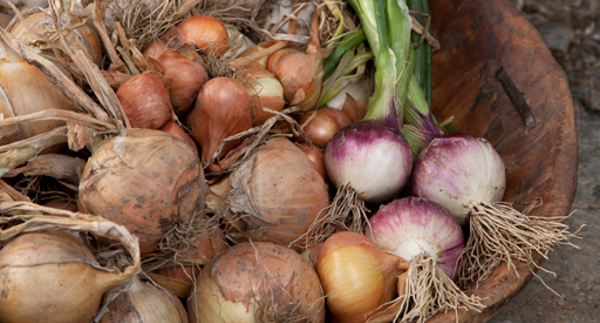
5 Steps to Onion Planting Success
- Choose a sunny spot to plant your onions. In New Zealand onion planting time is March-September, depending on region.
- Prepare your soil with organic matter like compost and sheep pellets.
- Add a layer of vegetable mix to plant into.
- Feed every four weeks during key growth periods.
- Keep your onions well watered particularly as the bulbs form in November and December.
Follow our full guide below to a bumper crop of homegrown onions.
A mainstay in any vege garden, onions are a versatile easy grow crop! They store well after harvest so can be enjoyed for months on end. Onions are the foundation of many types of cuisine all over the world, used fresh in salads and pickles, or added to stirfries, curries and soups.
The different types of onion available vary from large, round brown ones, to flat white and red onions, to bunching or spring onions. The flavour varies slightly from type to type, but the growing conditions are basically the same.
Choose a variety
- Borettanna: a cute little Italian button variety. As these onions are small, they are generally not cut up but eaten whole in stews or pickled.
- Californian Red: a very popular large, round plum-red skinned variety. Best used within a few months of harvest.
- Kelsae: a super-large brown variety which can weigh over 1.5kg. Has a mild, sweet flavour, but doesn’t store well.
- Pearl Drop: a pure pearl-white teardrop shaped miniature variety, perfect for salads.
- Pukekohe Long Keeper: the most widely grown variety in New Zealand, this large brown onion has a wonderfully strong flavour and keeps well.
- Purplette: a miniature red onion that matures quickly.
- Red Brunswick: bright red onions, with a milder flavour.
- Red Bunching: as its name suggests, this is a bunching spring onion variety with red stems. It doesn’t form a bulb, just thick stems. Very attractive and tasty, it can be eaten raw, roasted or cooked in stews.
- Ringmaster: a large white Spanish onion with a mild sweet flavour.
- White Bunching: a quick-growing white stemmed spring onion variety.
Prepare
Onions must be planted in full sun, in a well-cultivated soil. Prior to planting, add plenty of Tui Sheep Pellets and compost. Where possible leave the ground to settle for a week or so before sowing seed or planting seedlings.
Add a layer of Tui Vegetable Mix to the area before planting. It contains the right blend of nutrients to provide your veges with the best possible start and sustained growth throughout the season.
Plant
Main crop onions are sown in late winter/early spring ready for harvest in late summer to autumn. Onions can be sown in autumn, however won't be ready until the following summer, and will need protecting over winter in very cold areas.
Sow seed directly into the ground, or into trays. The new seedlings will look like grass and are very delicate. Transplant seedlings once they are big enough to handle without causing too much damage. Thin rows so plants are about 10cm apart.
Garden centres sell a good supply of onion seedlings throughout spring and summer. Onions will happily grow in pots and containers providing they have a soil depth of at least 20cm and a rich, moist vegetable mix to grow in.
Nourish
Onions need plenty of water to produce decent sized bulbs, particularly when these start to form in November and December. Keep the soil moist but not wet. Applying layers of Tui Pea Straw Mulch will help prevent weeds and reduce water loss from the soil.
Keep the area around the onions weed-free. Feed with Tui Vegetable Food every four weeks during key growth periods, or use Tui NovaTec Premium fertiliser - it feeds for up to four months.
For supercharged feeding with quick visible results try Tui Vege & Herb Liquid Superfood.
Harvest and storage
- Harvest onions in summer or autumn once the tops start to die back.
- Don't be tempted to pull the bulbs out by the leaves as these may snap off to leave the onion in the ground. Instead, dig the bulbs up with a fork and leave to dry on the top of the ground for a week or so.
- Plait the leaves together and store the onions somewhere dry and away from direct sunlight. In ideal conditions onions will store for up to six months.